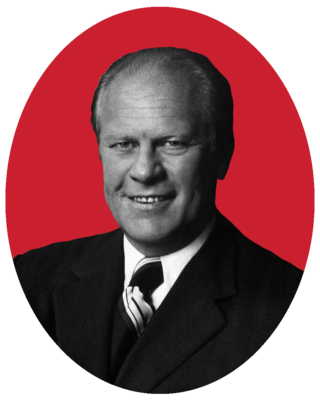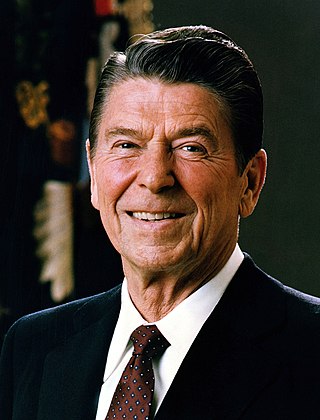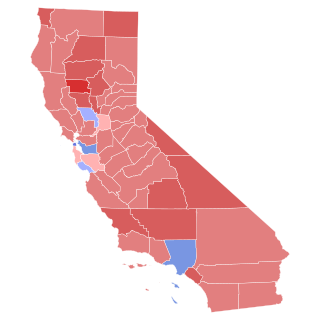
The 1976 Republican National Convention was a United States political convention of the Republican Party that met from August 16 to August 19, 1976, to select the party's nominees for president and vice president. Held in Kemper Arena in Kansas City, Missouri, the convention nominated President Gerald Ford for a full term, but only after narrowly defeating a strong challenge from former California Governor Ronald Reagan. The convention also nominated Senator Bob Dole from Kansas for vice president, instead of Vice President Nelson Rockefeller, who did not seek nomination for a full term. The keynote address was delivered by Tennessee Senator Howard Baker. Other notable speakers included Minnesota Representative Al Quie, retired Lieutenant Colonel and former Vietnam prisoner of war Raymond Schrump, former Texas Governor John Connally, Providence, Rhode Island mayor Vincent Cianci and Michigan Senator Robert P. Griffin. It is the last national convention by either of the two major parties to feature a seriously contested nomination between candidates.

The 1996 United States Senate elections were held on November 5, with the 33 seats of Class 2 contested in regular elections. Special elections were also held to fill vacancies. They coincided with the presidential election of the same year, in which Democrat Bill Clinton was re-elected president.

The 1986 United States Senate elections were elections for the United States Senate. Held on November 4, in the middle of Ronald Reagan's second presidential term, the 34 seats of Class 3 were contested in regular elections. The Republicans had to defend an unusually large number of freshman Senate incumbents who had been elected on President Ronald Reagan's coattails in 1980. Democrats won a net of eight seats, defeating seven freshman incumbents, picking up two Republican-held open seats, and regaining control of the Senate for the first time since January 1981. This remains the most recent midterm election in which the sitting president's party suffered net losses while still flipping a Senate seat.

The 1980 United States Senate elections were held on November 4, coinciding with Ronald Reagan's victory in the presidential election. The 34 Senate seats of Class 3 were contested in regular elections. Reagan's large margin of victory over incumbent Jimmy Carter gave a huge boost to Republican Senate candidates, allowing them to flip 12 Democratic seats and win control of the chamber for the first time since the end of the 83rd Congress in January 1955.

The 1978 United States Senate elections were held on November 7, in the middle of Democratic President Jimmy Carter's term. The 33 seats of Class 2 were contested in regular elections. Special elections were also held to fill vacancies. Thirteen seats changed hands between parties, resulting in a net gain of three seats for the Republicans. Democrats nevertheless retained a 58–41 majority.

The 1974 United States Senate elections were held on November 4, with the 34 seats of Class 3 contested in regular elections. They occurred in the wake of the Watergate scandal, Richard M. Nixon's resignation from the presidency, and Gerald Ford's subsequent pardon of Nixon. Economic issues, specifically inflation and stagnation, were also a factor that contributed to Republican losses. As an immediate result of the November 1974 elections, Democrats made a net gain of three seats from the Republicans, as they defeated Republican incumbents in Colorado and Kentucky and picked up open seats in Florida and Vermont, while Republicans won the open seat in Nevada. Following the elections, at the beginning of the 94th U.S. Congress, the Democratic caucus controlled 61 seats, and the Republican caucus controlled 38 seats.

From January 21 to June 3, 1980, voters of the Republican Party chose its nominee for president in the 1980 United States presidential election. Retired Hollywood actor and two-term California governor Ronald Reagan was selected as the nominee through a series of primary elections and caucuses culminating in the Republican National Convention held from July 14 to July 17, 1980, in Detroit, Michigan.

From January 29 to June 4, 1996, voters of the Republican Party chose its nominee for president in the 1996 United States presidential election. Senator Bob Dole of Kansas, the former Senate majority leader, was selected as the nominee through a series of primary elections and caucuses culminating in the 1996 Republican National Convention held from August 12 to 15, 1996, in San Diego, California; Dole resigned from the Senate in June 1996 once he became the presumptive nominee to concentrate on his presidential campaign.

Electoral history of Bob Dole, United States Senator from Kansas (1969–1996), Senate Majority Leader, Senate Minority Leader (1987–1995), 1976 Republican Party vice presidential nominee and 1996 presidential nominee.

The 2004 United States Senate election in Kansas was held November 2, 2004. Incumbent Republican U.S. Senator Sam Brownback won re-election to a second term.

The 2010 United States Senate election in Kansas took place on November 2, 2010, alongside other elections to the United States Senate in other states as well as elections to the United States House of Representatives and various state and local elections. Incumbent Republican U.S. Senator Sam Brownback did not seek a third term, but instead successfully ran for Governor of Kansas. Republican nominee Jerry Moran won the open seat.

The 1980 United States Senate election in Pennsylvania was held on November 4, 1980. Incumbent Republican U.S. Senator Richard Schweiker decided to retire, instead of seeking a third term.

The 1982 United States Senate election in California took place on November 2, 1982. Incumbent Republican U.S. Senator S. I. Hayakawa decided to retire after one term. Republican Pete Wilson, the Mayor of San Diego, won Hayakawa's open seat over Democratic Governor Jerry Brown and several minor candidates.

The 2014 United States Senate election in Kansas was held on November 4, 2014, to elect a member of the United States Senate to represent the State of Kansas, concurrently with other elections to the United States Senate in other states and elections to the United States House of Representatives and various state and local elections.

The 1968 United States Senate election in Kansas took place on November 5, 1968, concurrently with the U.S. presidential election as well as other elections to the United States Senate in other states as well as elections to the United States House of Representatives and various state and local elections.

The 2020 United States Senate election in Kansas was held on November 3, 2020, to elect a member of the United States Senate to represent the State of Kansas, concurrently with the 2020 U.S. presidential election, as well as other elections to the United States Senate, elections to the United States House of Representatives and various state and local elections.

The 2018 Kansas gubernatorial election took place on November 6, 2018, to elect the next governor of Kansas. Democratic nominee Laura Kelly won the election, defeating Republican nominee Kris Kobach and independent candidate Greg Orman.

The 1974 United States Senate election in Kansas took place on November 5, 1974. Incumbent Republican U.S. Senator Bob Dole was narrowly re-elected to a second term in office.

The 1978 United States Senate election in Kansas took place on November 7, 1978. Incumbent Republican Senator James B. Pearson did not run for re-election to a third full term.
John M. Simpson is a former politician and attorney from the U.S. state of Kansas. He served as a Republican in the Kansas State Senate from 1972 to 1979, before switching parties and unsuccessfully running as a Democrat in the 1980 election for U.S. Senate, challenging Republican incumbent Bob Dole.





















